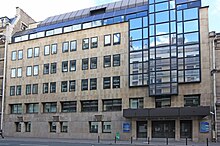
Back معهد باستور Arabic Інстытут Пастэра Byelorussian Институт „Пастьор“ Bulgarian Institut Pasteur Catalan Pasteurův ústav Czech Institut Pasteur German Ινστιτούτο Παστέρ Greek Institut Pasteur Esperanto Instituto Pasteur Spanish Pasteur Institutua Basque
 | |
| Founded | 1887 |
|---|---|
| Founder | Louis Pasteur |
| Type | Non-profit[1] |
| Purpose | Study biology, microorganisms, diseases and vaccines. |
| Location |
|
Area served | Worldwide |
| Services | Research, public health, training, innovation |
Official languages | French, English |
Key people | Yasmine Belkaid (President) François Romaneix (Senior Executive Vice-President Administration and Finance) |
| Employees | 2,780 |
| Website | www |

The Pasteur Institute (French: Institut Pasteur, pronounced [ɛ̃stity pastœʁ]) is a French non-profit private foundation dedicated to the study of biology, micro-organisms, diseases, and vaccines. It is named after Louis Pasteur, who invented pasteurization and vaccines for anthrax and rabies. The institute was founded on 4 June 1887 and inaugurated on 14 November 1888.
For over a century, the Institut Pasteur has researched infectious diseases. This worldwide biomedical research organization based in Paris was the first to isolate HIV, the virus that causes AIDS, in 1983. It has also been responsible for discoveries that have enabled medical science to control diseases such as diphtheria, tetanus, tuberculosis, poliomyelitis, influenza, yellow fever, and plague.
Since 1908, ten Institut Pasteur scientists have been awarded the Nobel Prize for medicine and physiology—the 2008 Nobel Prize in Physiology or Medicine was shared between two Pasteur scientists.
- ^ "Institut Pasteur". www.pasteur.fr. 6 September 2016.